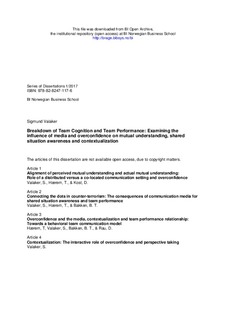| dc.description.abstract | In several settings, such as counter-terrorism operations and aviation, avoiding breakdowns in team cognition is essential for coordination and team performance.
This dissertation examines two assumptions concerning what affect teams ability to avoid breakdowns in team cognition: 1) certain media capabilities enhance team cognition more than others and 2) team members choose different media based on cost-benefit considerations to enhance team cognition. I explore the first assumption by developing and testing a more complex relation between media and team cognition, and I challenge the ssumption of the cost-benefit model by examining the role of overconfidence. I focus on two specific gaps regarding the influence of media and overconfidence on team cognition. The first gap focus on the influence on mutual understanding and shared situation awareness (Gap 1), and the second gap focus on contextualization (Gap 2). I explored these gaps empirically in four articles investigating threemember teams that engage in a simulated crisis management task and individuals taking part in a survey experiment. In these settings equivocality was induced through differences in information among team members. To examine Gap 1, I investigate in article 1 the influence of media richness and verconfidence on alignment of perceived and actual mutual understanding.
I found that there is a greater degree of alignment between perceived mutual understanding and actual understanding in a co-located than in an email setting. I also found a better alignment for those low in overconfidence than for those high in overconfidence. In addition, the findings suggest that people hold more shared actual mutual understanding and shared perception of mutual understanding in a o-located versus an email condition. Then, in article 2, I explore whether level 2 and 3 shared situation awareness mediate a positive effect of media richness on team performance. The findings indicate that level 2 shared situation awareness, in particular, and level 3 shared situation awareness, mediate a positive effect on team performance from media richness, and co-located media are helpful for sharedness of level 2 and level 3 shared situation awareness, and email is helpful for sharedness of level 1 shared situation awareness. To address Gap 2, article 3 discuss the relation among media richness contextualization and team performance, and suggest that higher levels of shared overconfidence will negatively moderate this mediated relation. The empirical findings indicated support for this suggestion. Finally, I also address Gap 2 in article 4 by further examining the boundary conditions of the influence of overconfidence on contextualization. Here I examine whether perspective taking reduces the possibly negative effect of overconfidence on contextualization, and found empirical support for this hypothesis. Taken together these findings could suggest that not only behavior but also the medium may be a central explanatory variable influencing teams ability to avoid breakdown in team cognition, and people’s cognitive biases, overconfidence, may distort adaptation processes to avoid such breakdowns. | nb_NO |
